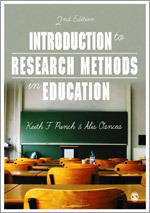Introduction to Research Methods in Education
- Keith F Punch - University of Western Australia, Australia
- Alis Oancea - University of Oxford, UK
Data Collection & Analysis | Educational Research Methods | Research Methods (General)
Based on Keith Punch’s bestselling Introduction to Social Research Methods, this book introduces the research process in a range of educational contexts. In this updated second edition, you’ll find guidance on every stage of research, with chapters on developing research questions, doing a literature review, collecting data, analysing your findings and writing it all up.
With a new chapter on ethics and additional coverage of Internet research and mixing methods, the second edition contains everything you’ll need if you’re studying on a research methods course or doing a research project for yourself.
Introduction to Research Methods in Education provides you with:
- Balanced coverage of the range of methods employed by educational researchers
- Practical advice on collecting and analysing qualitative, quantitative and mixed methods data
- A range of examples from student projects to show how research is done in real-life educational settings
- A companion website with additional resources for lecturers and students.
Keith F Punch is Emeritus Professor in the Graduate School of Education at The University of Western Australia.
Alis Oancea is Professor of Philosophy of Education and Research Policy, as well as Director of Research at the University of Oxford, Department of Education.
Supplements
Useful as an introduction to research methods and ways forward in research proposals
A comprehensive book, but prefer the Punch Social Science Research Methods rather than this Education focused one.
A good level of detail in each section and is presented in an accessible format
Great book developing the foundations to research methods is a must for students.
Very comprehensive, with overarching principles that cohere with my module.
Useful chapters on the literature review and developing research questions. The section on methodological theory will be particularly helpful to students who are designing their first project.
The use of key terms and example boxes really helps students work their way to successful completion of their dissertations.
Building on the first edition, this text provides really useful guidance for all sorts of educational research studies. We've recommended it to our PGCE student teachers, but it has plenty of useful advice for more experienced researchers as well. The new chapter on ethics is particularly useful and I have drawn on that to help with guidance about doing research in schools.
A key text for all those who wish to engage in Educational Research. A very comprehensive and accessible text.
Used for doctorate research purposes







